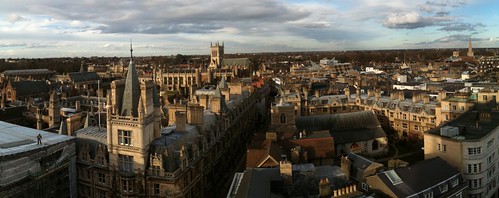
Cambridge from the bell tower at St Mary’s Church
I’ve quoted from this before, but I love John Littlewood’s essay “The mathematician’s art of work,” In this extract, the Cambridge offers “some practical advice about research and the strategy it calls for.”
In the first place research work is of a different order from the “learning” process of pre-research education (essential as that is). The latter can easily be rote-memory, with little associative power: on the other hand, after a month’s immersion in research the mind knows its problem much as one’s tongue knows the inside of one’s mouth. You must also acquire the art of “thinking vaguely,” an elusive idea I can’t elaborate in short form. After what I have said earlier, it is inevitable that I should stress the importance of giving the subconscious every chance. There should be relaxed periods during the working day, profitably, I say, spent in walking.
HOURS A DAY AND DAYS A WEEK On days free from research, and apart from regular holidays, I recommend four hours a day or at most five, with breaks about every hour (for walks perhaps). If you don’t have breaks you unconsciously acquire the habit of slowing down. Preparation of lectures counts more or less as research work for this purpose. On days with teaching duties, I can only say, be careful not to overdo the research. The strain of lecturing, by the way, can be lightened if you apply the golfing maxim: “don’t press.” It is, of course, hard not to. Don’t spend tired periods on proof correction, or work that needs alertness; you make several shots at an emendation that you would do in one when fresh. Even in making a fair copy one is on the qui vive for possible changes.
Either work all out or rest completely. It is too easy, when rather tired, to fritter a whole day away with the intention of working but never getting / [116-117] properly down to it. This is pure waste, nothing is done, and you have had no rest or relaxation. I said “work all out”: speed of associative thought is, I believe, important in creative work; another elusive idea, with which my psychological doctor agrees.
For a week without teaching duties- and here I think I am preaching to the converted – I believe in one afternoon and the following day off. The day off need not necessarily be Sunday, but that has a restful atmosphere of general relaxation, church bells in the distance, other people going to church, and so on. The day, however, should stay the same one of the week; this establishes a rhythm, and you begin relaxing at lunch time the day before.
At one time I used to work 7 days a week (apart, of course, from 3-week chunks of holidays). I experimented during a Long Vacation with a Sunday off, and presently began to notice that ideas had a way of coming on Mondays. I also planned to celebrate the arrival of a decent idea by taking the rest of that day off. And then ideas began coming also on Tuesday.
In these paragraphs, Littlewood beautifully and informally summarizes some of the key practices of deliberate rest: the conscious use of rest to nurture and sustain subconscious creative thinking, the mixing of focused and unfocused periods, the advocacy of exercise, and the practice of keeping an eye out for insights after breaks. It’s all in here, which is why I’m so enthusiastic about it.
Source: John Littlewood, “The mathematician’s art of work,” The Mathematical Intelligencer 1:2 (June 1978), 112-119.